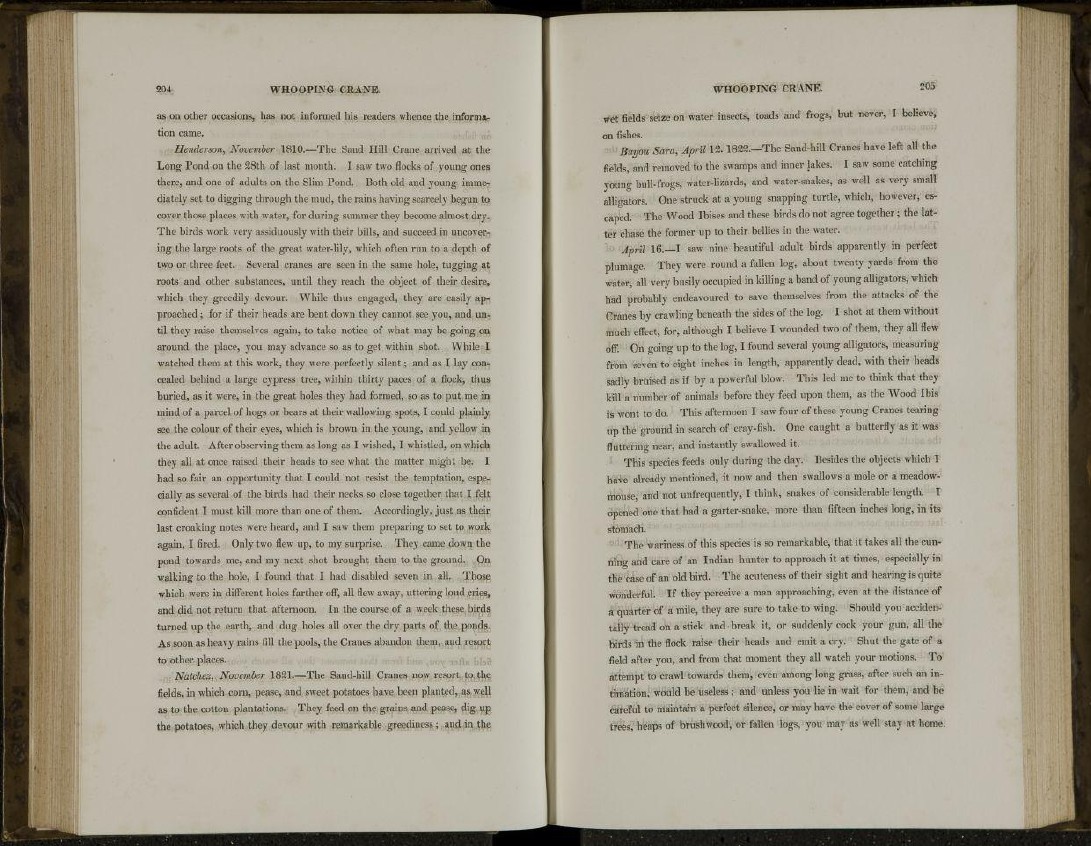
as on other occasions, has not informed his readers whence the information
came.
Henderson, November 1810.—The Sand Hill Crane arrived at the
Long Pond on the 28th of last month. I saw two flocks of young ones
there, and one of adults on the Slim Pond. Both old and young immediately
set to digging through the mud, the rains having scarcely begun to
cover those places with water, for during summer they become almost dry.
The birds work very assiduously with their bills, and succeed in uncovering
the large roots of the great water-lily, which often run to a depth of
two or three feet. Several cranes are seen in the same hole, tugging at
roots and other substances, until they reach the object of their desire,
which they greedily devour. While thus engaged, they are easily approached
; for if their heads are bent down they cannot see you, and until
they raise themselves again, to take notice of what may be going on
around the place, you may advance so as to get within shot. While I
watched them at this work, they were perfectly silent; and as I lay concealed
behind a large cypress tree, within thirty paces of a flock, thus
buried, as it were, in the great holes they had formed, so as to put me in
mind of a parcel of hogs or bears at their wallowing spots, I could plainly
see the colour of their eyes, which is brown in the young, and yellow in
the adult. After observing them as long as I wished, I whistled, on which
they all at once raised their heads to see what the matter might be. I
had so fair an opportunity that I could not resist the temptation, especially
as several of the birds had their necks so close together that I felt
confident I must kill more than one of them. Accordingly, just as their
last croaking notes were heard, and I saw them preparing to set to work
again, I fired. Only two flew up, to my surprise. They came down the
pond towards me, and my next shot brought them to the ground. On
walking to the hole, I found that I had disabled seven in all. Those
which were in different holes farther off, all flew away, uttering loud cries,
and did not return that afternoon. In the course of a week these birds
turned up the earth, and dug holes all over the dry parts of the ponds.
As soon as heavy rains fill the pools, the Cranes abandon them, and resort
to other places. SJOV ^fx& fofeft
Natchez, November 1821.—The Sand-hill Cranes now resort to the
fields, in which corn, pease, and sweet potatoes have been planted, as well
as to the cotton plantations. They feed on the grains and pease, dig up
the potatoes, which they devour with remarkable greediness; and in the
wet fields seize on water insects, toads and frogs, but never, I believe,
on fishes.
Bayou Sara, April 12. 1822.—The Sand-hill Cranes have left all the
fields, and removed to the swamps and inner lakes. I saw some catching
young bull-frogs, water-lizards, and water-snakes, as well as very small
alligators. One struck at a young snapping turtle, which, however, escaped.
The Wood Ibises and these birds do not agree together; the latter
chase the former up to their bellies in the water.
April 16.—I saw nine beautiful adult birds apparently in perfect
plumage. They were round a fallen log, about twenty yards from the
water, all very busily occupied in killing a band of young alligators, which
had probably endeavoured to save themselves from the attacks of the
Cranes by crawling beneath the sides of the log. I shot at them without
much effect, for, although I believe I wounded two of them, they all flew
off. On going up to the log, I found several young alligators, measuring
from seven to eight inches in length, apparently dead, with their heads
sadly bruised as if by a powerful blow. This led me to think that they
kill a number of animals before they feed upon them, as the Wood Ibis
is wont to do. This afternoon I saw four of these young Cranes tearing
up the ground in search of cray-fish. One caught a butterfly as it was
fluttering near, and instantly swallowed it.
This species feeds only during the day. Besides the objects which I
have already mentioned, it now and then swallows a mole or a meadowmouse,
and not unfrequently, I think, snakes of considerable length. T
opened one that had a garter-snake, more than fifteen inches long, in its
stomach.
The wariness of this species is so remarkable, that it takes all the cunning
and care of an Indian hunter to approach it at times, especially in
the case of an old bird. The acuteness of their sight and hearing is quite
wonderful. If they perceive a man approaching, even at the distance of
a quarter of a mile, they are sure to take to wing. Should you accidentally
tread on a stick and break it, or suddenly cock your gun, all the
birds in the flock raise their heads and emit a cry. Shut the gate of a
field after you, and from that moment they all watch your motions. To
attempt to crawl towards them, even among long grass, after such an intimation,
would be useless; and unless you lie in wait for them, and be
careful to maintain a perfect silence, or may have the cover of some large
trees, heaps of brushwood, or fallen logs, you may as well stay at home.